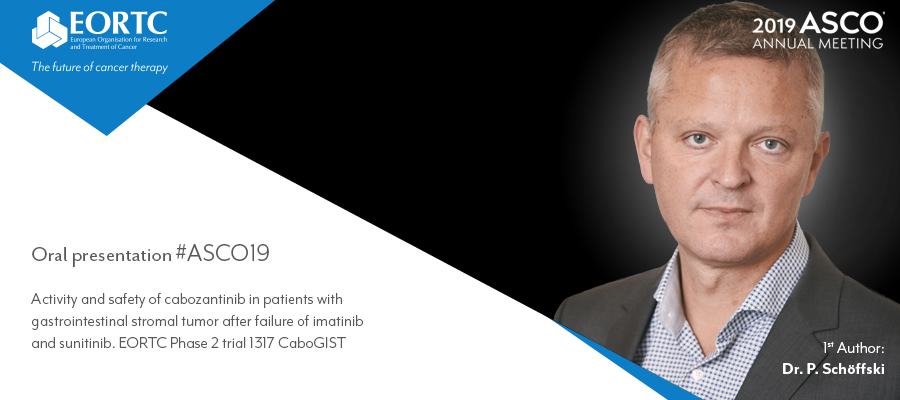Assessment of a potential new treatment option for patients with metastatic gastrointestinal stromal tumor (GIST) that may overcome resistance to established compounds
3 Jun 2019
At the ASCO Annual Meeting in Chicago an EORTC study (EORTC 1317) assessing the safety and activity of a novel compound drug was presented today.
This phase 2 study explored the activity and safety of cabozantinib, an oral small molecule tyrosine kinase inhibitor targeting KIT, VEGFR, MET, and AXL. Cabozantinib is already used for treatment of advanced medullary thyroid, renal cell and hepatocellular carcinoma. In 2013, researchers at the University Hospitals in Leuven, the top recruiting member institution of EORTC, reported signs of activity of the compound in self-made, patient-derived xenograft models of GIST in tumors sensitive or resistant to the standard of care agent imatinib. In 2015 a group at Memorial Sloan-Kettering Cancer Center showed that cabozantinib can possibly overcome compensatory MET signalling in GIST in vitro, a potential driver of secondary resistance in this rare disease.
GIST are the most common mesenchymal cancers of the gastrointestinal tract, and are mainly driven by mutations in the KIT gene which can be target with the KIT inhibitor imatinib. Over time, these tumours develop resistance to this drug. The same occurs with the subsequent use of other established agents, such as sunitinib and regorafenib.
In this single arm study (EORTC 1317 “CaboGIST”, NCT02216578, Eudract 2014-000501-13), 50 patients with metastatic GIST patients received 60mg of cabozantinib daily. Primary endpoint was the rate of progression-free survival at 12 weeks. It was predetermined that if at least 21 out of 41 eligible and evaluable patients were progression-free at week 12, the activity of the compound was sufficient to warrant further exploration (A’Hern one-stage study design).
Among the first 41 eligible and evaluable patients, 24 were progression-free at week 12, satisfying the study decision rule. Among all 50 treated pts, 30 were progression-free at week 12. Seven patients achieved a confirmed partial response (PR) and 33 patients stable disease (SD), translating into a high disease control rate of 80%. Median progression-free survival (PFS) was 6.0 months, which compares well with results seen with established drugs in imatinib-resistant disease in Phase 3 trials. In terms of safety, the most common cabozantinib-related grade >3 adverse events were diarrhea, hand-foot syndrome, fatigue, hypertension, weight loss and oral mucositis, with 33 pts requiring dose reductions and 25 having treatment interruptions. There was no treatment-related death and no new safety signal detected for cabozantinib.
It can thus be concluded that the study met its primary endpoint, with 24 out of 41 patients being progression-free at week 12. Results of this trial confirm earlier xenograft data, support the potential role of MET in resistant disease and warrant further clinical exploration of cabozantinib in GIST.
“The results of EORTC 1317 “CaboGIST” are based on a solid scientific rationale coming from our own laboratory, and are an important milestone in the potential development of a new treatment option for patients with imatinib- and sunitinib-resistant GIST,” says Principal Investigator, Professor Patrick Schöffski, Head of General Medical Oncology Department at the Leuven Cancer Institute.
Reference
Abstract number: #11006: Activity and safety of cabozantinib in patients with metastatic gastrointestinal stromal tumor after failure of imatinib and sunitinib. European Organization for Research and Treatment of Cancer (EORTC) Phase 2 trial 1317 “CaboGIST”
Patrick Schöffski, Olivier Mir, Bernd Kasper, Zsuzsanna Papai, Jean-Yves Blay, Antoine Italiano, Charlotte Benson, Katerina Kopeckova, Nasim Ali, Palma Dileo, Axel Le Cesne, Franka Menge, Sophie Cousin, Celine Charon-Barra, Agnieszka Wozniak, Sandrine Marreaud, Saskia Litiere, Axelle Nzokirantevye, Hans Gelderblom
Speaker: P. Schöffski
Related News
Meet the new EORTC Board
9 Jul 2024
We are pleased to announce the release of the EORTC 2023 Annual Report
17 Jun 2024
Dr Denis Lacombe, EORTC CEO, appointed stakeholder co-chair of ACT EU advisory group
24 May 2024
Clinical Trials Day 2024: a Q&A on pragmatic clinical trials
20 May 2024
EORTC/EMA workshop suggests an international way forward for treatment optimisation studies
8 May 2024
EORTC’s Participation at the ESTRO Congress 2024
29 Apr 2024
EORTC: Advancing research and treatment for rare cancers
29 Feb 2024
EORTC Fellowship Programme: celebrating more than 20 years of impactful collaboration
22 Feb 2024
Appointment of Malte Peters as EORTC Strategic Alliance Officer
9 Feb 2024
Unique series of workshops in partnership with the European Medicines Agency (EMA)
7 Feb 2024


